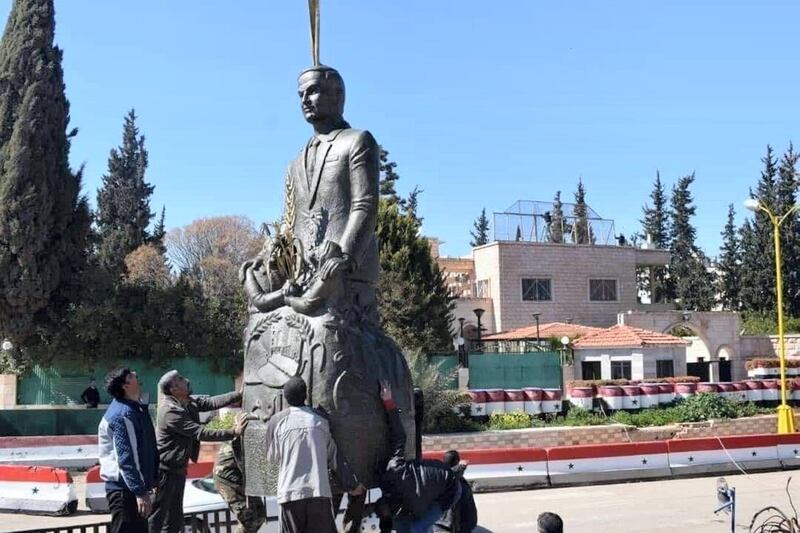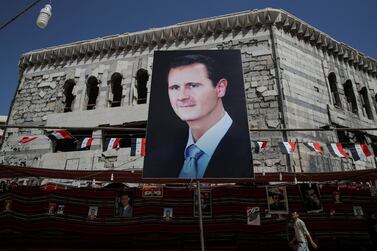Residents of Deraa in south Syria said they would not accept the return of an oppressive regime to their city.
Their warning came a day after hundreds took to the streets to demonstrate against a new statue of former president Hafez Al Assad – nearly eight years after residents toppled the original effigy at the outbreak of the 2011 uprising.
Demonstrators on Sunday marched through the city's shattered old quarter calling for the downfall of the Assad regime only days before the civil war's eighth anniversary on March 15.
Residents said it was merely their first warning against the return of the state. Described as the cradle of the revolution, Deraa was one of the first sites of mass protests against the rule of President Bashar Al Assad, the son of Hafez, who died after 29 years in power in 2000. Last July, Damascus – with heavy backing from Russia and Shiite militias – retook much of the country's south.
The regime’s slow return has angered residents, who have watched Mr Al Assad’s secret police pushing to re-establish the networks that once terrorised people into silence.
Prominent critics have been arrested despite assurances by Russian guarantors that civilians would not be targeted once the state took back control.
The government on Sunday announced a day off for schools and state employees to attend the unveiling of the bronze statue of Hafez Al Assad.
But what was planned as a festive occasion turned into an anti-Assad demonstration.
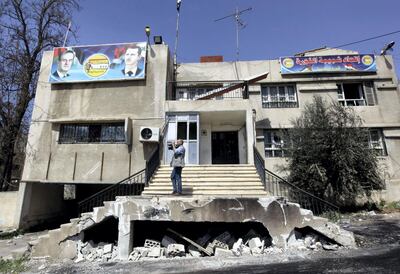
In the old city, young protesters brandished placards that read: “It will fall. Your statue is from the past, it’s not welcome here.”
“Syria is ours, not for the house of Assad,” demonstrators chanted, as security forces moved in to prevent others from joining.
"The Assad regime wants to imply by establishing a statue of [Assad's]s father in Deraa we all took an oath to obey and follow them – we didn't and will not [for it]," Mohammed, who asked that his real name not be used, told The National.
“People are furious. We know that if the regime did this with no major [provocative] act from the people [the regime] it will carry on and start interfering in our towns, arresting our young people to fight for their army. I hope that people keep demonstrating until we take down that statue.”
Since the return of the state, males of military age have been worried about being arrested and conscripted. Those who began their military service in 2011 are still fighting on the front lines, eight years on.
The protester who spoke to The National lived in rebel-controlled Deraa. Residents, he said, were no longer afraid of the government.
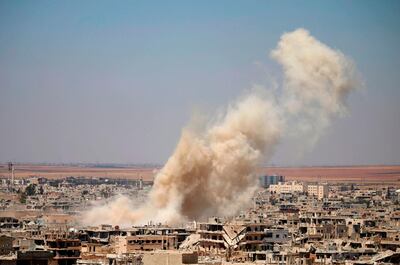
“Even though the regime took back the area, neither the government nor the Russians have checkpoints or police in the town,” he said. “They only stand on the main roads between villages.”
He said the reaction on Sunday was merely a warning of bigger things to come.
“The statue is a provocative action and it will be a beginning of something bigger if the regime doesn’t listen to us,” he said. “We refuse symbols of dictatorship. We are not afraid of Assad.”
Residents expressed anger at the government’s funding of the statue instead of addressing the city’s needs – like shattered buildings, poor services, frequent power cuts and unemployment.
"The area where the statue was rebuilt was where the old one was devastated by demonstrators," Ahmad Abazid, an Istanbul-based researcher and writer from Deraa, told The National.
Since the uprisings, Deraa has maintained a self-rule of sorts, without regime interference, Mr Abazid said. The Russians have served as an intermediary between the people and the regime.
“People don’t deal with the government and the Assad regime can’t enter areas ... because it’s not welcomed by the people,” he said.
“The regime’s next step will be to regain control over people and escalate against them. It might break into those areas and put pressure on the residents to stop the demonstrations.”
But most residents have no desire to back down. Salem, from Deraa, said the people would simply kick off a new revolution. "I wish another uprising would start and the regime would regret putting back this statue," he told The National. "We are not like before 2011 – we are no longer afraid but we are left behind and no one cares."
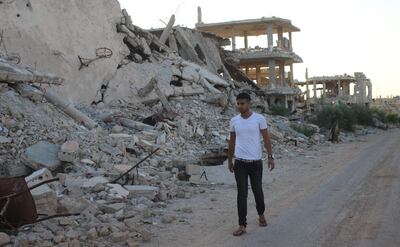
The people of Deraa, Salem said, could not forget the violence with which protesters were met by government forces in the early days of the revolution, or the bloody campaign Mr Al Assad later waged to recapture the country.
"Assad killed our families and friends, we will not forget or forgive them for what they did. They destroyed our lands and houses," he said.
Now, said Salem, the regime was not even a state. Security is in the hands of militias with no real authority to stop anyone, other than to check the identification of potential suspects.
Many, locals said, are Iran-backed groups operating across the south, near the occupied Golan Heights – despite Israel’s warnings that these groups risked becoming targets in future air strikes.
